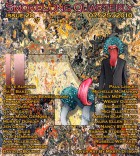Are all your stories based on movies?
Nope. First one.
Hitchcock put himself in his movies, at first just to save on extras, but later as a running gag. Where are you hidden in this piece?
Oh, I wish I’d thought to give myself a walk-on! I guess I’m hidden in the main character. Who hasn’t built up unrealistic hopes about a relationship, only to see in the end it is impossible?
Poets write about a painting and call it ekphrasis. When a fiction writer writes about a movie, what should we call it? Note: This will be the term used from now on, by everyone.
No pressure though! Seriously, I’m not very analytical. If fact, using terms like “ekphrasis” makes me twitchy and impatient, like a kid in school longing for recess. I’m not the kind of person for whom defining a technique makes it easier to use—it makes it harder, because it makes it seem like there are rules and expectations.
In your own life, what other Hitchcock movie would best describe you? More importantly, what Michael Bay movie—either directed or produced—are you? M. Night Shyamalan? Nancy Myers? Rob Zombie?
For Hitchcock, maybe “Shadow of a Doubt.” That’s the one in which Teresa Wright’s character idolizes her Uncle Charlie, played by Joseph Cotton. He’s charming, but as she gradually learns, he’s a murderer, the “Merry Widow” killer who preys upon recently divorced older ladies. It’s set in Santa Rosa, which is portrayed as (and maybe was, then) a small idyllic town. I had a pretty happy upbringing, and under those circumstances it can be hard to come to terms with how, well, evil people can be. But at the same time, the girl is her uncle’s namesake, and they are somewhat alike, so that she’s the only one who suspects what he really is. I think that’s what my writing is like too—I use the darkness inside myself to try to understand the darker side of the world. Also, I do have a walk-on in that movie. The younger sister is a little girl in glasses who is constantly
reading a book—and her name is Ann! When I was growing up, watching that movie with my older brothers, the first time they saw that little girl they laughed and looked over at me, as if to say “It’s you!”
I looked up Michael Bay on IMDB, and, surprisingly, I’ve seen very few of his movies. I did see he played “Goon #3” on an episode of Miami Vice, though, and I LOVED Miami Vice. Everything I aspired to be and wasn’t—cool, with all the right clothes and gadgets, great music, living exciting events in an exotic place.
As for other directors, I’m more a Billy Wilder type, I think.
Okay, so you’re William Holden in “Stalag 17,” only you have all your stuff you own now (for some reason). You’re leaving the Nazi prison camp forever: What are the three things you put in your bag to take with you?
I thought about this for a while and couldn’t decide. So that’s me: dithering and probably missing my chance to escape.
What do you think it is about hopeless romantics that makes such good characters? In other words, who are you stalking now?
No one—I’m happily married. I like hopeless romantics because I think we’d all like to make the big movie gesture—stand up and object during the wedding to another, follow your love onto a boat about to sail, serenade your love by holding up a boombox in the yard. And also to be that open and vulnerable—be willing to make a fool of yourself to get what you want. In “Say Anything,” when friends tell Lloyd Dobler they don’t want to see him get hurt by dating the wrong girl, he says “I want to get hurt!” That makes him a great character.
If you were in love with someone and knew, deep down, that it was a lost cause, what would you do to change their mind?
When I was younger, I used to do what Kim Novak’s character does in Vertigo—she tries to change herself to be what he wants. When Scottie (Jimmy Stewart’s character) is trying to talk Judy into dyeing her dark hair blonde, he says something like “it can’t possibly matter to you.” Well, of course it does, and no one who was really in love would ask her to do it! Judy thinks that if she just changes enough, he’ll love her. But that never works.
While reading your story, I noticed how nice of a job you do with keeping the perspective to the narrator, but at the same time, I couldn’t help but wonder what was going through the Cady’s mind, if she thought she was being wooed or perhaps led to her death. From a purely exercise-like front, what was she thinking as all this was going down?
To Cady, John’s just a friend with benefits. She knows he’s a little more serious about her than she is about him, but she doesn’t want to lose him by leveling with him. She’s like the high school girl trying not to break up with her boyfriend till after the prom. John has no idea what Cady is really like. And Cady has no idea what John is like either—how obsessive he is. She’s not worried, just a little uncomfortable that he’s trying to turn her vacation into a big deal, and maybe dimly realizing that this situation is going to be more difficult than she thought. She can appreciate a movie about obsession, but cannot imagine herself as the object of such an obsession.
I think that this character is pretty unreliable, as in, everyone knows this isn’t going to work by story’s end. What does John do next? In other words, what’s the sequel?
When I started writing this story I was sure his startup was going to fail, but now I think that in fact it succeeds and he becomes rich. When the next story opens, he’s paid a thousand dollars to take a zeppelin ride over San Francisco. The cute flight attendant is talking to two handsome Australian tourists though John’s champagne glass is empty. The zeppelin is strangely silent as it flies. Below him, the towers of the Golden Gate Bridge poke up like pins, and though the zeppelin is far above them, John starts to sweat. The attendant laughs, breathy and low.
What’s your sign?
Gemini—the twins.



 The core workshop of SmokeLong Fitness is all in writing, so you can take part from anywhere at anytime. We are excited about creating a supportive, consistent and structured environment for flash writers to work on their craft in a community. We are thrilled and proud to say that our workshop participants have won, placed, or been listed in every major flash competition. Community works.
The core workshop of SmokeLong Fitness is all in writing, so you can take part from anywhere at anytime. We are excited about creating a supportive, consistent and structured environment for flash writers to work on their craft in a community. We are thrilled and proud to say that our workshop participants have won, placed, or been listed in every major flash competition. Community works.